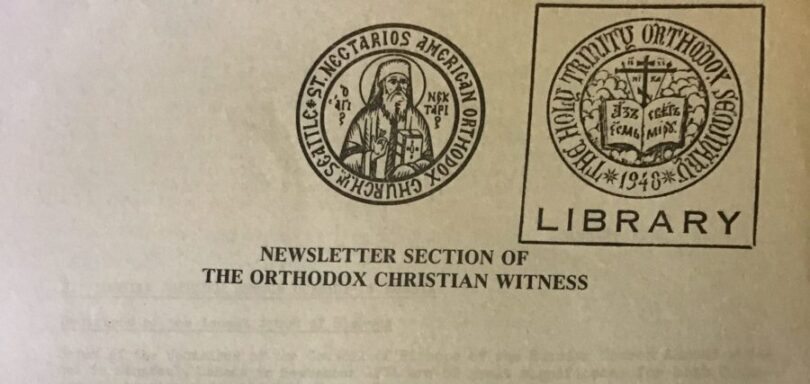As described in the last chapter, the growing Ecumenical Movement produced a tremendous restlessness in every Orthodox jurisdiction. On the one hand were priests and bishops anxious to participate in ecumenism; on the other hand, many were now prompted to take a closer look at Orthodox history, tradition, and, especially, ecclesiology (the Church’s teaching about herself, her nature, and her boundaries). Various ecumenical events in the United States brought this into sharp focus. In particular, Archbishop Iakovos who, as exarch for the Patriarch of Constantinople and presiding bishop of the Greek Orthodox Archdiocese of North and South America, was the most visible hierarch of the largest Orthodox denomination in the United States, seemed to lead the way. In the mid- and late-1960s, he participated in ecumenical services at St. Patrick’s Cathedral in New York, and, upon the death of Cardinal Spellman, served an Orthodox requiem at the bier as if Spellman had been an Orthodox hierarch. All of this prompted Metropolitan Philaret to write the following to him:
“In Church practice, very much is based on precedent. Thus, the higher the position of him who sets the precedent, the more importance it may acquire. Therefore, acts performed by Orthodox hierarchs in their contacts with the representatives of other confessions or religions have a special significance, and in those cases in which they violate the order accepted over the centuries, they cannot leave us uninvolved. Our silence might be construed as consent…
Which ecclesiastical canon, which custom, which tradition gave You the right to introduce such novelties? Orthodoxy by its very nature is distinguished by its fidelity to traditions and to the examples of the Holy Fathers… A novelty that does not conform to this bears in itself the stamp of unorthodoxy…
Genuine love toward the heterodox consist[s] of zeal to enlighten them with the light of truth and in caring for their genuine reunion with the Church.” [1] Orthodox Word, (March/April 1969).
In the past, congenial relations between the Church Outside Russia and the Greek Orthodox Archdiocese had existed, but these now abruptly ceased as Archbishop Iakovos dropped the Church Abroad from his list of Churches with which the Archdiocese had inter-communion; in the future, he was to dismiss Metropolitan Philaret and the Synod as “uncanonical.”
During this same period, a dozen or so Greek-American clergy, uneasy over Iakovos’s ecumenical activities, defected to the Russian Church Outside Russia. Since they were received without a canonical release from Archbishop Iakovos — quite possibly a mistake on the part of the Church Abroad — the Greek primate considered these priests defrocked.
Among the Greeks to join the exiled Church was a certain Archimandrite Panteleimon (Metropoulos). He had grown up in the Greek Archdiocese but was tonsured on Mount Athos, where he was advised, because of Archbishop Iakovos’s increasing ecumenism and modernism, to join the Church Outside Russia. A charismatic young man of considerable gifts, Fr. Panteleimon was able to attract many to the monastic life. Over the years, he had successfully established the Holy Transfiguration Monastery, a large monastery for men located in a suburb of Boston, as well as the Holy Nativity Monastery, a smaller monastery for women. In addition, more than a dozen Greek-style parishes around the country were formed through his leadership, all of which were under the jurisdiction of the Synod of the Church Abroad.
Metropolitan Philaret and the other bishops appreciated the traditionalism, zeal, and evident piety of the Greek members of their jurisdiction, but didn’t initially comprehend that theirs was a fervor bordering on fanaticism. Increasingly, cult-like behavior centered on the person of Fr. Panteleimon who, to the amusement and later scandal of the Russians, not only allowed himself to be called “Elder” (in Russian ‘staretz’, in Greek, ‘geronte’), but also came to believe himself to be a kind of “saviour” for the Russian Church, being more orthodox than the bishops themselves.
Fr. Panteleimon’s lack of natural modesty, and the immaturity of some American converts who followed him, transformed the Abbot into a kind of “guru,” with disciples in virtually every parish in the country. As the years went by, many Russians began to speak of the “Boston Party” or the “Panteleimonites” — a kind of “synod within the Synod.”
In general, Fr. Panteleimon felt that the Church Abroad was not outspoken enough concerning ecumenism and modernism, notwithstanding the “Sorrowful Epistles” of Metropolitan Philaret and many other Synodal statements. He began to misrepresent the policy of the Russian Synod toward other jurisdictions, saying, both in sermon and in print, that all other Orthodox jurisdictions were essentially without sacramental grace because of their ecumenist betrayal of the Faith. He spoke of the Church Outside Russia as the “sole Ark of Salvation” left on the face of the Earth, and often rebaptized those coming to him from other jurisdictions, although this was forbidden. There may have been one or two hierarchs that privately agreed with these extreme views — at times it appeared that Metropolitan Philaret and Bishop Gregorii (formerly Archpriest George Grabbe, who at this time was the powerful secretary to the Synod), were among them — but the majority view was that the Church Abroad, as a local Church, should not sit in judgment on other jurisdictions, but could only call others back to Orthodox faithfulness. Nonetheless, Fr. Panteleimon continually exaggerated the moderate views of the Synod, alienating many clergy and faithful in other jurisdictions who might otherwise have been inspired by the traditionalist views of the Church Abroad. With the notable exception of the Serbian Church, with whom the Church Abroad had always maintained ties, an unproductive spirit of isolationism began to settle over the Church Abroad.
The Orthodox Christian Witness, a widely distributed weekly publication written by Fr. Neketas Palassis, a former priest of the Greek Archdiocese and an ardent disciple of Fr. Panteleimon, had for years attacked various Orthodox jurisdictions on the question of ecumenism. The tone of these attacks had not been one of objective analysis and evaluation (which would have been welcome), but polemical, sarcastic, and biting—a tone deeply offensive to the American temperament, regardless of one’s ethnic background. The Greeks in the Church Abroad justified this offensive style by claiming that this was the way “Greeks talk to one another.”
In fact, the Greek and Russian temperaments, forged in the unique crucibles of their own histories, were markedly different. As one observer explained:
“It is perfectly understandable that the “mind’’ of the Greek Orthodox Church on these issues would be different from the “mind” of the historical Russian Orthodox Church.
The Greek Orthodox Church emerged from ages of Turkish persecution only in the last century. During the time of the Turks, every method imaginable was used to exterminate the Orthodox faith… The ecclesiastical “mind” of the Church under these conditions developed a highly rigoristic approach that was necessary in order to preserve the faith.
In Russia, on the other hand, the situation was very different: the Orthodox faith, even during the Tatar yoke, was never in danger of extinction… The situation… was also unique, and required a very special approach. Rigorism would not have sufficed, and [moderation] and Economy became the accepted approaches.” [2] “A Second Open Letter to Fr. Neketas Palassis,” (March 4, 1978).
The Russian bishops felt that the polemical approach of Fr. Panteleimon’s group was not only a case of differing temperaments but just plain “bad manners”; furthermore, the content of these attacks concerned questions best left to the hierarchs — the policymakers of the Church — to discern and evaluate.
In 1978, Archbishop Lavr, abbot of Holy Trinity Monastery and rector of the Seminary, informed Fr. Neketas of his and other bishops’ displeasure concerning these attacks. In his letter to Fr. Neketas, he said, “…it is necessary to fight against corrosion of the faith and it is necessary to make a stand for its purity, but I consider that should be done from within, as your brothers [in the Greek Archdiocese] are doing, and not by hiding behind us [the Synod Abroad]” (italics added). He regretted the impression that the Church Abroad was interfering in the problems of other jurisdictions, adding that “we should not become involved in other peoples’ affairs, especially when we have our own pressing problems.” [3] Letter by Archbishop Lavra to Fr. Neketas Palassis, (March 4, 1978).
Fr. Neketas and the whole “Greek Party” were deeply offended by this letter, and replied not in a spirit of humility and obedience, but with an evident desire to “teach” the bishops: “The ‘affairs’ that we deal with in the Orthodox Witness,” he wrote, “are matters of Faith, and matters of Faith are neither ‘Greek affairs’ nor ‘Russian affairs,’ they are not phyletic affairs nor yet ‘other peoples’ affairs’… Dear Vladika, we have tried to understand the problems of our Synod and have responded to them on many occasions. It seems, though, that there are some who do not try to understand our situation and griefs… We are distressed at the prospect that we may again be found in a position where we are not understood, and our concern for the Faith is not heeded.” [4] Ibid. The implied threat was clear: if you don’t listen to us, we’ll do what we did with Archbishop Iakovos, and simply leave the Russian Church Abroad.
Meanwhile, the Old Calender Synods in Greece were among the few that did not participate in the Ecumenical Movement. (The Old Calendar Movement arose after the Patriarch of Constantinople and the State Church of Greece left the Julian Calendar and adopted the Gregorian, or New Calendar, in 1924, an act which had been strongly protested by Metropolitan Anastasii when he was archbishop in Constantinople; the Russian Church — both in the Soviet Union and in exile — has always remained staunchly Old Calendar.) A few Greek Old Calendar leaders were as stridently extreme in their views as Fr. Panteleimon; others expressed the same moderate view as the Russian Synod in New York. It is not surprising, then, that serious divisions developed over the years among these Old Calendar groups, resulting, in some cases, with different churches mutually defrocking and anathematizing one another.
For obvious reasons, the Church Abroad had always been profoundly sympathetic to the traditionalism of the Greek Old Calendar Movement. Just as the Russian Church in exile considered itself the free voice of the Soviet-controlled Mother Church, the Old Calendarists saw themselves as the voice and conscience of their Church, which they perceived as enslaved to modernism and ecumenism.
During the latter years of Metropolitan Anastasii’s leadership, the episcopacy of the Greek Old Calendar Movement began to die out. It seemed natural to the Greeks to ask the Russian Church Abroad to consecrate new bishops for them. Anastasii was opposed to this, for he wished to maintain cordial relations with the Greek Church in both America and Greece, and Archbishop Iakovos was adamantly opposed to the Old Calendar Movement. Nonetheless, other hierarchs of the Church Abroad, privately and quietly, without Anastasii’s knowledge, performed these consecrations. It was not until several years later, in 1969, that the Church Abroad finally gave public and official recognition to these consecrations, declaring the “True Orthodox Christians” of Greece to be a “sister Church.”
Fr. Panteleimon had been much involved, both personally and politically, with various Old Calendar bishops and abbots in Greece, often acting as a self-appointed representative to the Russian hierarchs. He had intense likes and dislikes among the Old Calendar personalities, had fallings-out with them at different times, and frequently misrepresented the Russian Synod to the Greeks, and vice versa. Little of this had to do with ecclesiology, but instead reflected Fr. Panteleimon’s own ambitions.
Although small in numbers, some of the Greek Old Calendar groups had parishes, and even a few bishops, in America with ecclesiastical ties to Greece. Fr. Panteleimon knew most of them and tried unsuccessfully to persuade them to enter the Russian Church Outside Russia. Since they resisted, articles critical of them began to appear in Fr. Neketas’s publication, in spite of the fact that such polemics had been forbidden. Although Metropolitan Philaret had often personally sympathized with the opinions of Fr. Panteleimon — to such an extent that the Greeks saw him as an ally — on the question of attacking the Greek Old Calendarites, the Metropolitan and the other bishops were not to be moved. In February 1985, the Synod adopted a formal resolution on the subject:
“The Russian Orthodox Church Outside Russia has lovingly assisted its [Old Calendar] Greek brethren in the organizing of their Church without, however, desiring to meddle in their life. When internal disagreements arose among them, and attempts were made by one side or another to appeal for our support, we decided to remain aloof, so that we might not introduce new complications through ignorance of the Greek language, ecclesiastical personalities and their personal relationships.”
The bishops wished to remain outside the sphere of Greek Old Calendar activities
“…until such time as the longed-for unity of those Greek bishops faithful to pure Orthodoxy comes about….Therefore, it is a necessity that those Greek clergymen who are subordinate to our bishops also remain aloof from any participation whatever in the lamentable divisions, whatever their personal opinions are concerning one or another question of ecclesiastical life in Greece. We have always taken care that the speeches of the clergymen who are within our canonical jurisdiction not be understood as an intrusion of the Church of Russia into the affairs of the Church of Greece, which is not subject to her.” [5] Extract from Minutes of Synod Bishops, (February 5, 1985).
The followers of Fr. Panteleimon saw this as one more rebuff.
By 1983, the Ecumenical Movement was stronger than ever. The Church Abroad, seeing that even many of its own Russian faithful were confused by the ecumenical “fashion” all around them, and wishing to clearly warn them, promulgated a formal “Anathema” against the “ecumenical heresy.” In the words of Archbishop Vitalii of Montreal:
“By proclaiming this Anathema, we have protected our flock from this apocalyptic temptation and, at the same time, have reluctantly put before the conscience of all the local Churches a serious issue which, sooner or later, they must resolve in one way or the other. The future spiritual fate of the universal Orthodox Church depends on the resolution of this problem. The anathema we have proclaimed is de jure a manifestation of a purely local character of the Russian Church Abroad, but de facto it has immense significance for the history of the universal Church… The place of the Russian Church Abroad is now plain in the conscience of all the Orthodox. The Lord has laid a great cross upon us, but it is, however, no longer possible to remain silent, for continued silence would be like a betrayal of the Truth, from which may the Lord deliver us all!” [6] Orthodox Life, (July/August 1984).
However, the wording of the ecclesiastical ban was vague: no specific Orthodox hierarchs or jurisdictions were identified as “ecumenists,” making it possible for others to “fill in the blanks,” and the document did not receive a sufficiently wide distribution or publicity even within the Church Abroad.
Fr. Panteleimon and his followers, however, seized on the anathema as proof that the Church Abroad finally shared their own narrow and rigoristic ecclesiology. They began to proclaim that “all” other jurisdictions, because of their participation (no matter how small or remote) in the Ecumenical Movement, had fallen under the ban of this anathema and were now clearly heretics. In particular, they applied it to the ecumenically active Moscow Patriarchate. This did not sit well with the bishops, however, for if the Church in the Soviet Union were now in heresy, how could the Church Abroad justify her continued existence as the “free voice” of a “heretical Church?”
In fact, over and over the Synod reiterated her position with regard to Moscow, declaring on the one hand that “we can have no communion with the Moscow Patriarchate, which finds itself completely subservient to the atheistic government,” but on the other hand maintaining that, “without separating itself from the Mother Church, following her life with an attentive, loving, and devoted gaze, the part of the Russian Orthodox Church which finds itself outside of Russia rejoices at her successes and grieves over her tribulations and trials.” [7] Orthodox Life, (January/February 1982). At the same time, “the Russian Church Abroad, now headed by Metropolitan Philaret, professes itself to be an inseparable part of the historic Russian Church…[with] the right to summon its [own] regular Councils and to enforce its resolutions.” [8] Orthodox Life, (July/August 1984). This was clearly not the view Fr. Panteleimon was pressing on the Russian hierarchs.
Before all of this could come to a head, however, Metropolitan Philaret entered his last days.
References
| ↵1 | Orthodox Word, (March/April 1969). |
|---|---|
| ↵2 | “A Second Open Letter to Fr. Neketas Palassis,” (March 4, 1978). |
| ↵3 | Letter by Archbishop Lavra to Fr. Neketas Palassis, (March 4, 1978). |
| ↵4 | Ibid. |
| ↵5 | Extract from Minutes of Synod Bishops, (February 5, 1985). |
| ↵6 | Orthodox Life, (July/August 1984). |
| ↵7 | Orthodox Life, (January/February 1982). |
| ↵8 | Orthodox Life, (July/August 1984). |












Did ROCOR under St Philaret consecrate bishops for the Old Calendarists and what was his justification?
No.